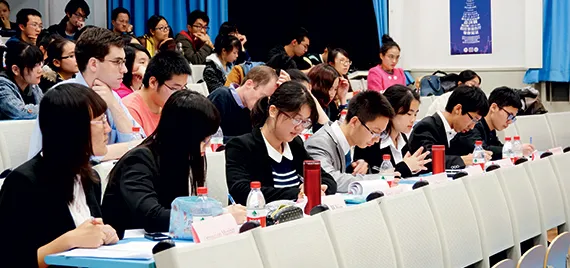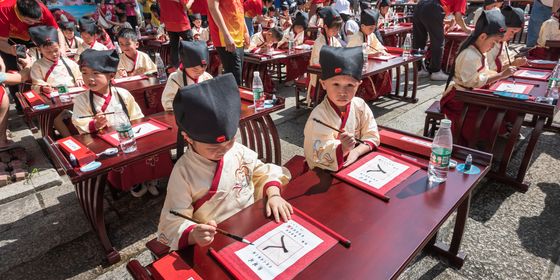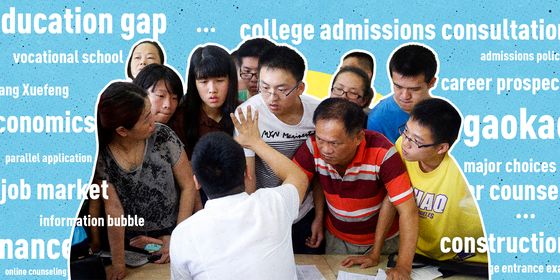Debating societies in China face battles off-stage
Tables and people are all crammed into a small classroom at Changsha’s University of Science and Technology. Three judges face the speaker’s desk in front of the classroom; one of them calls for silence: “The motion that stands before this house is, ‘This house would ban media from reporting on ongoing criminal trials.’” The eight students in the first two rows shuffle nervously, “Without further ado, I would like to call upon the prime minister to open the case for the government side. Hear, hear!”
What ensues is a one-hour debate about the objectivity of judges in the criminal justice system, the responsibility and ethics of media, and the right of people to be informed vis-à-vis the dangers of a trial influenced by public opinion.
Heavy stuff? Maybe. And certainly not what most Chinese students would engage with during their education after just 15 minutes of preparation.
The University of Science and Technology was the location of the first regional preliminary tournament for the FLTRP Cup—China’s national championship in English debating. Between mid-March and the end of April, five regional tournaments took place all over China to select the teams that will compete in Beijing in late May. The participants are university students studying various majors, from engineering to English. Some of the approximately 150 students were new to the challenges of British Parliamentary (BP) debate when they arrived in Changsha, others had been preparing for more than a year and even competed in the last World Championships in Malaysia.
Zheng Bo is affectionately called “Bo brother” by a lot of Chinese debaters. The tall Beijinger has been debating for almost ten years, teaching and judging all over the country. He has seen his fair share of students give up or succeed.
He says that teaching debate in China isn’t always easy—years of traditional, Confucian-style teaching, where students are taught what is right or wrong, don’t really cultivate critical thinking: “The system mainly requires students to remember what their teacher says. They’ve never been trained in thinking on their own and making decisions on their own. And then they go to university and even their university is probably chosen by their parents,” Bo explains. “But, when they start debating, people find themselves in a position where they consider the pros and cons of everything, even their own decisions.”
That’s what happened to Wang Xiwen, who is studying English translation in her second year at Hunan Normal University. “Most Chinese students rush to go abroad and to take tests like TOEFL, even if it’s very expensive and there are no scholarships,” she states. “But I didn’t want to waste my parents’ money and, in the end, going abroad is mainly a means to broaden my horizons. So, I decided to stay in China, read a lot, and debate to do that instead.”
Both she and her partner, Xi Yuan, started debating about a year ago, mainly because of their charismatic English teacher from the United States. But they stuck with it—despite threats from the university to punish them for missing classes. “They thought we were just being lazy, but when we started to win tournaments, they changed their views quite quickly,” says Wang Xiwen, visibly amused. Public speaking is valued much higher in their university, but neither likes it—for them, it focuses too much on manner and rhetoric, not enough on content and logical analysis. “I just hate learning things by heart,” Xi Yuan says, as opposed to traditional classes and Chinese forms of debate.
These two aren’t the only ones facing administrative obstacles and resistance from schools. Zheng Bo actually deems it to be the biggest hurdle to debating in China. But interestingly, the Chinese education system may not always be that bad: “In the end, it’s about assertions within societies and you have those everywhere. On top of that, the Chinese style of teaching can actually have some advantages; students are used to studying hard and when they apply what they know from other subjects to debate, the result is an interesting, kind of nerdy debater who reads a lot.”
What cannot be turned into an advantage are the often opaque administrative systems of China’s universities. Even if a debating tournament or practice has the support of students and a few teachers, it can be called off at any time. Administrators don’t even need to give a reason. So, before debaters can start to convince judges, they often have to convince people in their own university of what they’re doing.
While the difference between the demands of English debating and the rest of the Chinese education system may create obstacles, it also draws students to the activity—it’s something they cannot find anywhere else in their education system. And when it comes to convincing parents that debating is worthwhile, the skill set derived from it can be quite persuasive. Public speaking in English, persuasiveness, and communication skills not only come in handy for interviews with American graduate schools, but also on the job. “It’s kind of amazing to see how good debaters are at these things compared a lot of their peers of the same age who have just stepped out of university,” Zheng Bo muses, before recounting the story of a debater who ended up working as an HR manager in a Fortune 500 company; in just his first week, he was giving a presentation that was broadcast to all branch offices.
…….
“For the sake of argument” is a story from our issue, “Startup Kingdom”. To continue reading, become a subscriber and receive the full magazine. Alternatively, you can purchase the digital version from the iTunes Store.












